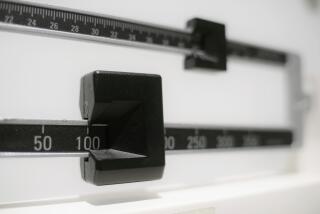Mini-meals or three squares a day?
- Share via
Deciding how often to eat can be almost as vexing as choosing what to eat. Are three daily, regularly spaced meals the best recipe for fat burning? Or five to six mini-meals?
The recent publication of “The 3-Hour Diet” by fitness guru and best-selling author Jorge Cruise is likely to fuel the debate. In the book, Cruise contends that the timing of meals is as important as what’s eaten.
For successful weight loss, he insists, meals should be spaced three hours apart during waking hours -- until three hours before bedtime.
Yet despite more than 40 years of research into the question of whether eating three large meals or multiple small meals is best, “no clear consensus has emerged,” noted a recent editorial published in the American Journal of Clinical Nutrition.
Whether you eat three meals -- or six -- weight loss ultimately comes down to calories, concluded the editorial’s authors, Elizabeth J. Parks, assistant professor of human nutrition at the University of Minnesota, and Megan A. McCrory, associate professor of nutrition and exercise science at Bastyr University in Kenmore, Wash.
Here’s how the latest research stacks up:
* Eat breakfast. Numerous studies point to the importance of breaking the overnight fast with food.
That first meal of the day doesn’t have to be eaten immediately upon rising, although there’s evidence to suggest that consuming food within an hour or so of waking helps keep blood sugar levels even, insulin production steady and lowers hunger.
Members of the National Weight Control Registry, a group of more than 3,000 people who have successfully lost at least 30 pounds and kept it off for at least three years, report that eating breakfast is key to their efforts.
In February, a team of British researchers reported the effects of skipping breakfast on a small group of healthy, lean women. Participants first spent two weeks eating a breakfast cereal with 2% milk before 8 a.m. and then having a cookie between 10:30 to 11 a.m. daily. They then ate four additional meals spaced throughout the day.
After a two-week break, participants ate a cookie at 10:30 to 11 a.m. and then had cereal and milk between noon and 1:30 p.m. They then had four more meals throughout the day.
Reporting in the American Journal of Clinical Nutrition, the researchers concluded that skipping breakfast resulted in greater consumption of calories and changes in insulin sensitivity that could lead to weight gain.
* Do a little math. Take the daily number of calories you’re aiming for and divide by the number of meals you want to eat.
(To estimate daily calories to maintain your current weight, multiply your body weight in pounds by 10. Then add about 20% to 40% more calories if you’re sedentary; 40% to 60% more if you’re active.)
So if you aim for the average 2,000 calories daily recommended for most adults, you could have about 650 calories at each meal or roughly 325 calories at each of six meals.
“I know that people hate to do the math, but it’s not that hard,” McCrory says
(To trim pounds, daily calories need to be in the 1,200 to 1,600 range.)
* Mix it up. That means having a few ounces of lean protein with a serving of complex carbohydrates and a bit of healthy fat.
It’s this mixture that helps keep blood sugar and insulin levels steady. A few smart choices: banana with peanut butter; soup with beans and a whole-grain cracker; low-fat or nonfat yogurt with fruit.
* Pay attention to portions. That’s a key strategy whether you eat three regular meals daily or five to six mini-meals.
One of the biggest concerns about mini-meals is that beginning to eat each meal “is like letting a tiger out of a cage,” says Parks. “The more meals that you allow in your day, the more opportunity you have to overeat.”
* Engage in regular eating. British researchers reported in January that obese women who ate regular meals at roughly the same time every day consumed fewer total calories, metabolized calories better, lowered blood cholesterol levels and showed improvement in insulin production compared with when they ate irregular meals.





